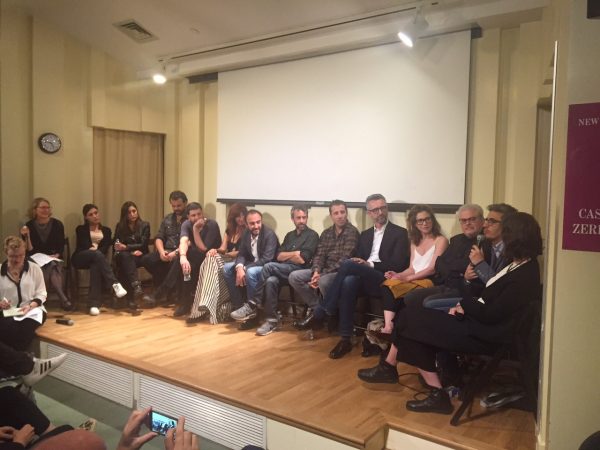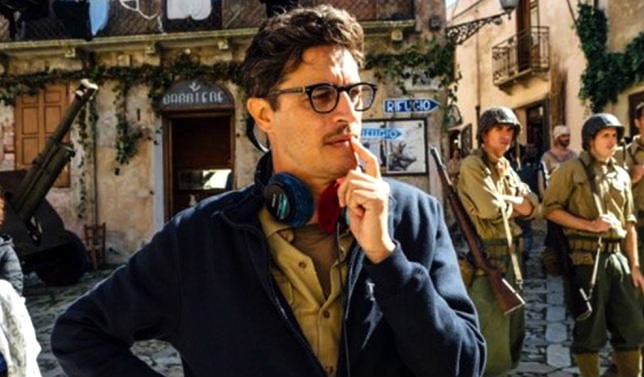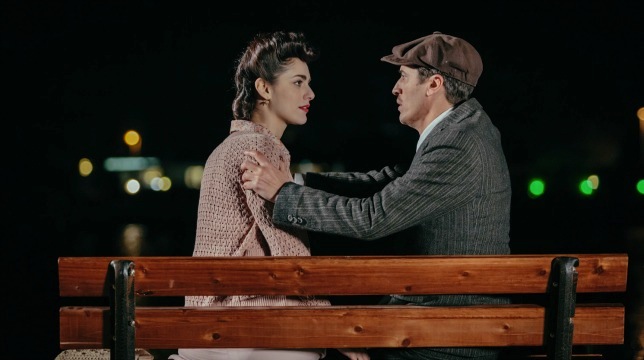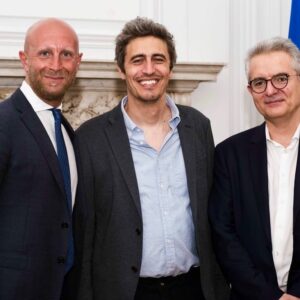Last week, we met with Pier Francesco Diliberto, artistically known as Pif, in New York, where he and other directors attended Open Roads at the Lincoln Center, to present his 2016 film “At War with Love.” Once again, as was the case three years ago for his film “The Mafia Kills Only in Summer,” Pif presented a film about the “Cosa Nostra,” in this case not only referring to Sicilians but also Americans and he examines the political storyline, or better, with the allied government during World War II. Here is the film that returns to the invasion code-named Operation Husky, with the landing in Sicily in June 1943. This operation marked the true beginning of the end of the Nazi-Fascist axis, which came a year before D-Day Normandy! Over 40 years ago, in the American movie about the famous general “Patton,” protagonist of the landing, the issue of the mafia was ignored (intentionally?).
Pif, with his romantic comedy at first glance only, tries to explain to the rest of the world, for once and for all, what the mafia is and also something that Sicilians have known forever: America became allies with the mafia to facilitate their landing, to contain the loss of lives, and also to help social control during the occupation. Yes, it’s the classic “the enemy of my enemy is my friend.” Then, since the “understanding” worked so well, this Allies-Mafia relationship also extended to the other war, that “cold” one, with the “containment” of Communism. Here is when the mafia became an icy ally, once again that “instrument of local government” as it had been for the Piedmonts in 1860, after the Giuseppe Garibaldi’s landing in Sicily. History repeats itself…
An excellent film, this of Pif’s, because it is well made and goes straight to the heart of the matter. Of course, it’s comical, like Roberto Benigni’s “Life is Beautiful,” but to make everyone finally understand, what the mafia is and why it is so difficult to combat it without become its victim.
At the end of the debate that took place at New York University’s Casa Italian Zerilli Marimò on Saturday, June 3, with the directors participating at Open Roads, Pif granted this interview to La Voce di New York.

Pif, your movie on the mafia and America is having its North American premiere in New York. What are you expecting and how do you think an American audience will react?
“Well, that was the question we asked ourselves after we finished the screenplay. I’m very curious. The only contact I had had with America and Americans was when the movie was shown to the foreign press in Italy and when I asked an American journalist how American will take it. He replied, “You’ll have to specify that you didn’t make anything up.” Because Americans ignore that historical fact. I fear that the majority of the audience will say “we did the right thing,” in that the American troops in the film do in Sicily what they recently did in Syria, Afghanistan, Iraq, …”
To take such actions has consequences, perhaps in the short run it works, but then…
“Exactly. Even in Syria and in Afghanistan at that instance they won, but in the long run, no. Instead, Sicily has always paid, even in the long run: the role of the mafia during the war is similar to the Partisans in northern Italy, because the mafia decided to back the resistence against Nazi-Fascism. The mafia is not idealogical, it backs whomever makes it with worth their while. Then after the war the mafia assumed an anticommunist role and continued to have power. There was never any real intention to deafeat it. Perhaps there was a homicide that was truly upsetting and the State was obligated to intervene to give at least a warning, but there wasn’t any real intention to defeat the mafia”.
What was the greatest difficulty in the making of this movie?
“The usual time/money factor, it was very complex to tell this story…”

In preparation of the movie, given that you and Michele Astori co-wrote the screenplay, what difficulties did you encounter? Since it’s a period piece, even if it has a comedic quality, entwined with a love story that goes from Brooklyn all the way to Siciliy, the facts must verified. So, from the viewpoint of documentation, what difficulties did you face?
“Few in fact, because there are many books and many testimonials and the BBC made plenty of documentaries in which they interviewed Italo-American soldiers that arrived in Sicily. The difficulty was to portray everything explaining all of this. The film begins as if it were an introductory history lesson: “It’s 1943 and Europe is under the Nazi rule of Adolf Hitler and his ally was Benito Mussolini…” And someone wonders “Why must you narrate things in such a banal way?” I had to do it because people are not aware of this landing in Italy and many with whom I speak confuse it with Garibaldi’s soldiers landing in Marsala, for example…”

Now Pif, you’re forcing me to ask you a question that I was going to ask you at the end of the interview, but you preempted it. The movie you made was already made by a movie great and was actually one of the greatest…
Precisely. There too the story told is about a landing and the military conquest of Sicily, of a mafia mayor whose name is also Don Calogero, ally of the new power and who manipulated voting… Practically the same story as your film but set 83 years earlier, in 1860 instead of 1943. The story of the alliance between Sicilian conquerors and Mafiosi: are you aware that you’ve made a movie with a story that is narrated in a basic way, as you say, that can make us truly understand what the mafia is and why it remained in power for so long in Sicily?
(Pif laughs before responding) “…I define “At War with Love” a prequel to my first film “The Mafia Kills only in Summer” because in that film is a take on the mafia of the ’70s, ’80s e ’90s, the mafia of Totò Riina. Here I explain how we got to that mafia. Now the Sicilian vulgate doesn’t hold that the Americans asked for permission from the mafia to arrive in Sicily. The mafia wasn’t that powerful or organized. The United States was. But once they arrived in Sicily, America asked: “Who’s in charge here?”

We can see it clearly in your film, in the scene of the mafioso who says to the Americans “Why do we need to get weapons in the way, when we’re among friends…”
“Americans don’t know the Siciliy of 1943, the only connection they have is the mafia. The Brits have freemasonry. It’s a given fact. I always preface this with the fact that I am happy that the Americans freed us, yet…”
But they could have done it better…
“Oh yeah, because we went from a Fascist regime to a mafia regime.”
In Leonardo Sciascia’s “The Day of the Owl,” another great novel written in the same period that Giuseppe Tomasi di Lampedusa’s “The Leopard,” detective Bellodi (an antifascist partisan) says to himself, after he realizes what the mafia is, Sciascia makes him say, “that Sicilians were more free under Fascism than with the Italian Republic.” Like in your film, the scene in which everyone was in the square, hugging the Americans and there is a little old Fascist feeling lost. He doesn’t understand what’s going on because he sees the Americans hugging the Mafiosi…
“The truth is that it didn’t make us look good: we were Fascists, we tried to be clever by allying ourselves with Hitler, thinking we would quickly win. As Fascists, we declared war on the Allies and the Americans replied tragically by bombing us and striking and killing civilians. Then when the Americans landed, the first thing we do is thank them, our liberators and become lovers of liberty and democracy. And we were Fascists! For this reason, many Americans do not write good things about Sicilian people in various publications: what I learned over the course of many years is that this historic moment was never talked about because we never took a good hard look at ourselves. We blamed Hitler for everything, forgetting that trains to the concentration camps full of Jews, homosexuals and gypsies left from Italy, from Milan’s Central Station. The Germans think about it and reflect on it every day, even now. We don’t.”

You touched, through a love story that could appear to be sheer entertainment, the true meaning of the mafia. In this context, you stop your story just before the start of the Cold War. You stop before May 1st, 1947, Portella della Ginestra… Do you intentionally stop there? Would it have been too much for an American audience?
“I tried to tell the entire story, trying to make it clear what was going to happen after. And it’s understand by the final speech given by the mafioso mayor…”
Why is it that mafiosi are given license to shoot against trade unionists and communists…
“Since it has been the unofficially declared the role of the mafia against communism. Americans have no reason to stop it.”

Power is given to hyenas, to the mafiosi who kill prey that is left isolated, that now one wants to protect. Let’s get back to the Americans. When the mafia killed Giovanni Falcone, 24 hours after the bomb exploded, the FBI said to the Italian authorities “We can come help you.” And indeed, they did. How do you see this gesture? A guilt complex?
“Certainly Giovanni Falcone was known for his work, and, in fact, his bust is in the garden of FBI headquarters. But when I say the intention was to not fight against the mafia, I consider this intention to not be totally firm. Within any single state there are always those who work to ensure that a certain thing happens and those who oppose it. Within the Italian nation, the magistrates, the police died for this (and they were all Sicilians, except for Dalla Chiesa – ndr). I’m convinced, but this a personal opinion, it’s not a coincidence that after the fall of the Berlin Wall, there was a real battle against the mafia, making great strides. In the trial against Andreotti, an FBI agent testified and evidently his superiors told him it was okay to testify against Andreotti. Probably if the wall hadn’t fallen, that agent would never have testified.”
 In 1860, the mafia was put into power by the Piedmonts, says Giuseppe Tomasi di Lampedusa in “The Leopard”. In 1943, they were put into power once again as you tell us. Now we are at a crucial third moment, in a situation where it seems the mafia doesn’t have the power it once had in the past. Is it a simple case or is there no one who will give them a comeback? If this is the case, could Sicily truly be freed? Or vice versa, do you fear that the current turmoil can renew vigor to crime in Sicily, to reclaim the mafia as an “instrument of local government”? Have we at last reached a time where we can finally free ourselves of the mafia?
In 1860, the mafia was put into power by the Piedmonts, says Giuseppe Tomasi di Lampedusa in “The Leopard”. In 1943, they were put into power once again as you tell us. Now we are at a crucial third moment, in a situation where it seems the mafia doesn’t have the power it once had in the past. Is it a simple case or is there no one who will give them a comeback? If this is the case, could Sicily truly be freed? Or vice versa, do you fear that the current turmoil can renew vigor to crime in Sicily, to reclaim the mafia as an “instrument of local government”? Have we at last reached a time where we can finally free ourselves of the mafia?
“Now the Sicilian mafia is in crisis because there is an economic crisis and they are having problems giving money to the relatives of prisoners, and the state made the state. There was Riina’s mad and erroneous strategy that declared war in a way that helped weaken crime paradoxically. You’re suggesting to me something I naively never considered: surely there will continue to be a serious cultural collusion problem with the mafia. Currently, there are the elections in Palermo and a candidate, Fabrizio Ferrandelli has as a supporter a person like Totò Cuffaro (Former Sicily’s Regione President, condemned for mafia connections, served seven years in prison). In another country, a candidate should distance himself from Cuffaro or in the very least, a scandal should erupt. Not in Italy. If you say he’s accused and on trial for aiding and abetting the mafia, he’s innocent until the finish, to put him on trial three times. If in the end he is guilty and is sent to jail, “well, he’s served his time”: it seems that he comes out clean. This is a dramatic sign because culturally we are colluded. We can only defeat the mafia when we Sicilians decide to defeat them by our own hand.”
Palermo as cultural capital for 2018 might help?
“Certainly, but I want to say is: many times when you try to explain what the mafia is, despite everything, even if your interlocutor is cultured and aware, he will never understand you.”
But you Pif, you’ve explained what the mafia is very well, when the mayor Don Calò at the end, is the famous rally where he says “we are democracy because you need us.”
“Yes, well, it’s as if the mafioso mayor would say ‘We are the State.”

This movie will be distributed even in America, correct? Since it’s 50% in English, language won’t be an obstacle.
“We are in negotiations but there’s a good chance that we will have a distributor, yes.”
So now I’ll ask: the moment in which you could reach your objective to have everyone understand the mafia, even Americans, are you perhaps afraid? Do you fear revenge or that you suffer the consequences? Falcone met his objective, he didn’t die in vain, the guilty verdicts from the Maxi Trial confirm it. Now I’m not talking about physical harm, by all means, but do you fear repercussions professionally, that you won’t be able to continue making movies…
(Once again Pif laughs before responding) “The sad truth unfortunately is that no one really cares. It was right to make this film. I’m glad I made it. But the bitter truth is that the mafia theme is not of interest. To be of interest across the board, society should take a good hard look at itself, at its past. It’s great to label antimafia a priest or an artist, but everyone must look at themselves, confront the past, but that could prove to be difficult and could hurt us, so we prefer to avoid it.”
I’ll end with one last provocation: do you realize that your film could also prepare the American public to understand the mafia and consequently to understand how and why president John Kennedy died?
“I never knew. Let’s say I wasn’t that ambitious, I didn’t dare as much: let’s see, I hope I was able to help.”
Translated by Enza Antenos











